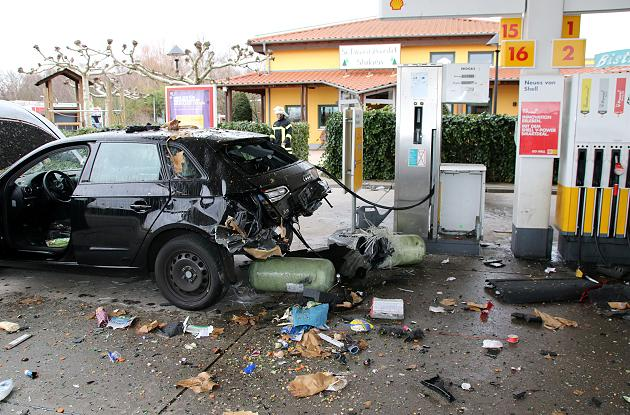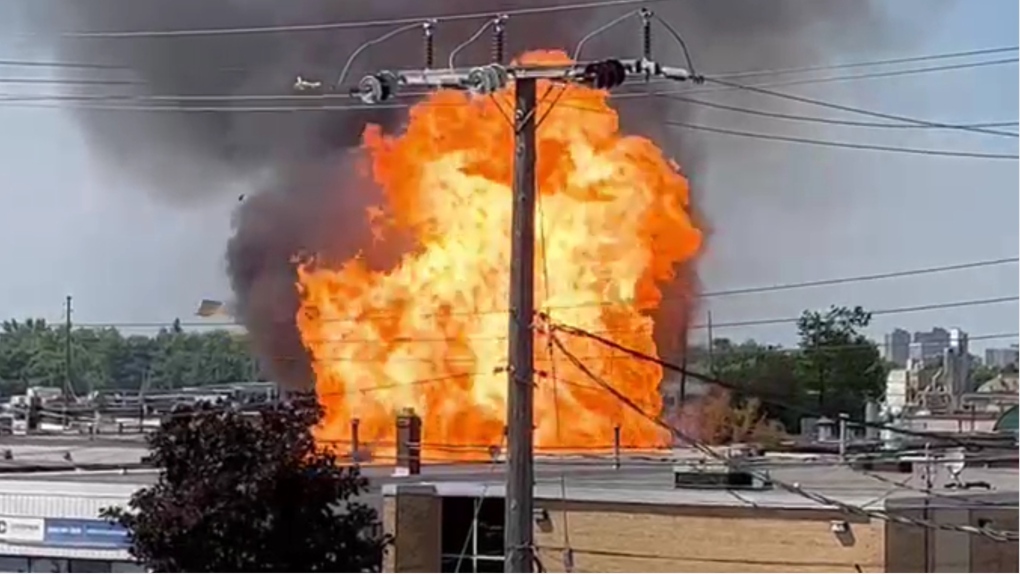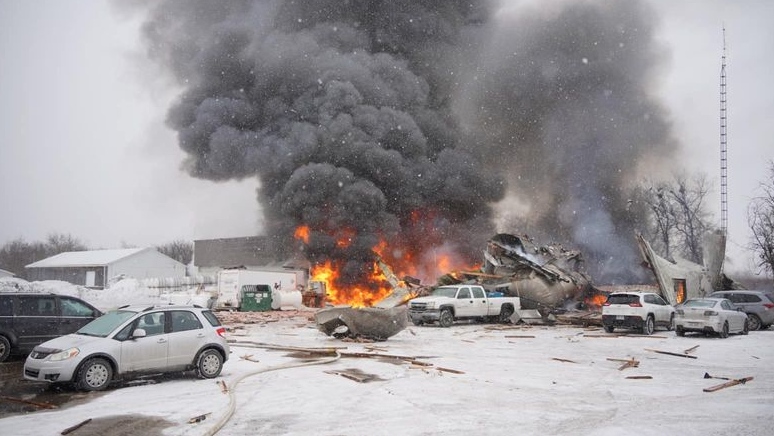You are using an out of date browser. It may not display this or other websites correctly.
You should upgrade or use an alternative browser.
You should upgrade or use an alternative browser.
Toyota's Hydrogen Engine Instead of EVs
- Thread starter ZeeOSix
- Start date
Me? I’d flatten it with coal or nuclear baseline capacity and natural gas peaking units. But maybe that’s just me.
OVERKILL
$100 Site Donor 2021
You have roughly the same amount of wind capacity as Ontario (a little over 5GW), but about 1/3rd the nuclear capacity (with OL-3), yet nuclear is the largest single source and this is from before OL-3 was online:I was agains wind power about 10-15 years ago, when our government paid fairly big subsidies for those ”futile windmills”. To my surprise, today the wind power here is totally profitable on its own without any subsidies, and there’s a lot of them built every year with private money only. Whoa, didn’t see that coming.
Give them another 10-15 years, and they will fix also the duck curve, I’m sure. For example with local peaker hydrogen plant (create hydrogen when there’s excess electricity, ’burn’ hydrogen back to electricity when needed).
We’ll get there, just need some time (some decades).
Replace coal with nuclear and wind/solar and I think you are on a good track. Natural gas can be kept as a peaker for nowMe? I’d flatten it with coal or nuclear baseline capacity and natural gas peaking units. But maybe that’s just me.
Hydrogen-ICE seems to be a good non-CO2 engine candidate for semi-trucks and similar heavy duty applications. Maybe not so much for passenger cars. For passenger cars hydrogen fuel cell seems to be a better option with its 2x efficiency on low loads.
From wikipedia:
A hydrogen internal combustion engine vehicle (HICEV) is a type of hydrogen vehicle using an internal combustion engine. The absence of carbon means that no CO2 is produced, which eliminates the main greenhouse gas emission of a conventional petroleum engine. The efficiency of a hydrogen combustion engine can be similar to that of a traditional combustion engine.
The comparison with a hydrogen fuel cell is interesting. The fuel cell has a high efficiency peak at low load, while at high load the efficiency drops. The hydrogen combustion engine has a peak at high load and can achieve similar efficiency levels as a hydrogen fuel cell. From this, one can deduct that hydrogen combustion engines are a match in terms of efficiency for fuel cells for heavy duty applications.
At a stoichiometric air/fuel ratio, the combustion temperature is very high and as a result it will form a large amount of nitrogen oxides (NOx), which is a criteria pollutant. Since one of the reasons for using hydrogen is low exhaust emissions, hydrogen engines are not normally designed to run at a stoichiometric air/fuel ratio.
Typically hydrogen engines are designed to use about twice as much air as theoretically required for complete combustion. At this air/fuel ratio, the combustion temperature is lower and formation of NOx is reduced to near zero. Unfortunately, this also reduces the power output to about half that of a similarly sized gasoline engine. To make up for the power loss, hydrogen engines are usually larger than gasoline engines, and/or are equipped with turbochargers or superchargers.
The differences between a hydrogen ICE and a traditional gasoline engine include hardened valves and valve seats, stronger connecting rods, non-platinum tipped spark plugs, a higher voltage ignition coil, fuel injectors designed for a gas instead of a liquid, larger crankshaft damper, stronger head gasket material, modified (for supercharger) intake manifold, positive pressure supercharger, and high temperature engine oil. All modifications would amount to about one point five times (1.5) the current cost of a gasoline engine. These hydrogen engines burn fuel in the same manner that gasoline engines do.
From youtube:
Hydrogen tank of HICE must be about 6x bigger in volume compared to gasoline tank of ICE for the same range. Hydrogen fuel cell needs only 3x tank size, thanks to its two times more efficient fuel usage.
Wiki:
https://en.m.wikipedia.org/wiki/Hydrogen_internal_combustion_engine_vehicle
Youtube:
From wikipedia:
A hydrogen internal combustion engine vehicle (HICEV) is a type of hydrogen vehicle using an internal combustion engine. The absence of carbon means that no CO2 is produced, which eliminates the main greenhouse gas emission of a conventional petroleum engine. The efficiency of a hydrogen combustion engine can be similar to that of a traditional combustion engine.
The comparison with a hydrogen fuel cell is interesting. The fuel cell has a high efficiency peak at low load, while at high load the efficiency drops. The hydrogen combustion engine has a peak at high load and can achieve similar efficiency levels as a hydrogen fuel cell. From this, one can deduct that hydrogen combustion engines are a match in terms of efficiency for fuel cells for heavy duty applications.
At a stoichiometric air/fuel ratio, the combustion temperature is very high and as a result it will form a large amount of nitrogen oxides (NOx), which is a criteria pollutant. Since one of the reasons for using hydrogen is low exhaust emissions, hydrogen engines are not normally designed to run at a stoichiometric air/fuel ratio.
Typically hydrogen engines are designed to use about twice as much air as theoretically required for complete combustion. At this air/fuel ratio, the combustion temperature is lower and formation of NOx is reduced to near zero. Unfortunately, this also reduces the power output to about half that of a similarly sized gasoline engine. To make up for the power loss, hydrogen engines are usually larger than gasoline engines, and/or are equipped with turbochargers or superchargers.
The differences between a hydrogen ICE and a traditional gasoline engine include hardened valves and valve seats, stronger connecting rods, non-platinum tipped spark plugs, a higher voltage ignition coil, fuel injectors designed for a gas instead of a liquid, larger crankshaft damper, stronger head gasket material, modified (for supercharger) intake manifold, positive pressure supercharger, and high temperature engine oil. All modifications would amount to about one point five times (1.5) the current cost of a gasoline engine. These hydrogen engines burn fuel in the same manner that gasoline engines do.
From youtube:
Hydrogen tank of HICE must be about 6x bigger in volume compared to gasoline tank of ICE for the same range. Hydrogen fuel cell needs only 3x tank size, thanks to its two times more efficient fuel usage.
Wiki:
https://en.m.wikipedia.org/wiki/Hydrogen_internal_combustion_engine_vehicle
Youtube:
Last edited:
One thing just occurred to me, I recall when discussing cars that are converted to run natural gas or LPG, you had people questioning the safety aspect of having this type of fuel on board. Despite a proven track record in other countries around the world and taxi service here in NA.
Now we are discussing hydrogen and people don’t seem to be concerned at all.
Interesting how the perception of safety is so fickle.
Now we are discussing hydrogen and people don’t seem to be concerned at all.
Interesting how the perception of safety is so fickle.
Yes, I think the hydrogen tank itself is the most worrying technical part of a hydrogen passenger car. Highly flammable and highly compressed gas + hydrogen embrittlement (see link below). Might not make sense on passenger vehicles.
However, on heavy duty vehicles / long haul trucks there’s plenty of room to where to place the gas tanks. In those applications it doesn’t matter as much if the hydrogen tanks are filled to less pressure to resuce risk for rupture (requires that tank sizes are increased). At this point I vote H-ICE as possible future CO2-neutral solution for long haul trucks and similar heavy duty applications.

 en.m.wikipedia.org
en.m.wikipedia.org
However, on heavy duty vehicles / long haul trucks there’s plenty of room to where to place the gas tanks. In those applications it doesn’t matter as much if the hydrogen tanks are filled to less pressure to resuce risk for rupture (requires that tank sizes are increased). At this point I vote H-ICE as possible future CO2-neutral solution for long haul trucks and similar heavy duty applications.

Hydrogen embrittlement - Wikipedia
Last edited:
lpg tank up to 8 bar in very hot summer, winter 1barOne thing just occurred to me, I recall when discussing cars that are converted to run natural gas or LPG, you had people questioning the safety aspect of having this type of fuel on board. Despite a proven track record in other countries around the world and taxi service here in NA.
Now we are discussing hydrogen and people don’t seem to be concerned at all.
Interesting how the perception of safety is so fickle.
cng tank ~250bar - mandatory periodic tank checks
h2 tank 700bar
cng

We have at work LPG driven trucks, but you need to start them with diesel. Aslo passage cars from VW offering bio/LPG cars in EU.One thing just occurred to me, I recall when discussing cars that are converted to run natural gas or LPG, you had people questioning the safety aspect of having this type of fuel on board. Despite a proven track record in other countries around the world and taxi service here in NA.
Now we are discussing hydrogen and people don’t seem to be concerned at all.
Interesting how the perception of safety is so fickle.
If you’re a scuba diver, homebrewer or work in fire safety around fire extinguishers/SCBAs, you’re probably familiar with a compressed gas tank needing a hydrostatic test and visual inspection every 5 years. Else, you can’t get air/gas fills. Composite tanks haven’t caught on in scuba - buoyancy and after Luxfier had some failures of them in use, diving scrapped them.lpg tank up to 8 bar in very hot summer, winter 1bar
cng tank ~250bar - mandatory periodic tank checks
h2 tank 700bar
cng

xNG buses are sent to the junkyard after 10 years - the cost to replace the tanks are more than the scrap value of the bus. I don’t think DOT requires the tanks to be removed and hydro’d every 5 years.
lpg tanks must be replaced after 10y, but no periodic checks
it could be 150€ for mine, 30L
it could be 150€ for mine, 30L
Fixed it for you.From wikipedia:
A hydrogen internal combustion engine vehicle (HICEV) is a type of hydrogen vehicle using an internal combustion engine. The absence of carbon at the tailpipe, means that no CO2 is produced, which eliminates the main greenhouse gas emission of a conventional petroleum engine. The efficiency of a hydrogen combustion enginecanbe similaris not even close to that of a traditional combustion engine, when the full energy production cycle is taken into account.
Ballard Energy has been pushing hydrogen since the 70s. It doesn't work.
transport is a non-issue as all sorts of pressurized highly flammable gas moves across the country everyday. when is the last time a propane truck blew up or any other industrial gas incident.I'd be surprised if 5% of the 5% comes from "renewable" electrolysis. IIRC, it's grid power, which is mostly not VRE.
Any industrial process is most efficient (hydrogen production included) running flat-out 24/7, which means it can't be economically powered by wind and solar. Hydro? yes, nuclear? Yes. Running it intermittently not only affects the economics, it's harder on the equipment resulting in higher maintenance costs.
All that said, hydrogen presents massive challenges beyond just production. Transporting it is a huge issue, as is having Average Joe handling thousands of PSI of an invisible odourless and highly flammable gas. EV's are, in comparison, massively simpler, given the fuelling infrastructure is already mostly in place and the hazards (electricity) are currently handled by Average Joe daily.
no different then how propane cars were so "dangerous"
OVERKILL
$100 Site Donor 2021
Hydrogen is significantly more challenging to handle and transport than propane. It's extremely leaky, invisible, has no smell, and requires extremely high pressure. Some of the challenges are outlined in this article:transport is a non-issue as all sorts of pressurized highly flammable gas moves across the country everyday. when is the last time a propane truck blew up or any other industrial gas incident.
no different then how propane cars were so "dangerous"
Hydrogen transportation and distribution pose specific issues in terms of safety. The issues are strongly related to the chemical and physical properties of hydrogen: its ability to embrittle materials, its ease in escaping from containment, its wide flammability range, and the limited amount of energy needed to ignite it, all represent barriers to safe use. At the same time, its extremely low density is a guarantee that the gas will likely ascend instead of forming dense dangerous clouds as other hazardous gases do.
The very wide flammability range does not work in favor of safety but the buoyancy decreases the possibility of cloud formations at low heights (where human receptors are closer). In the event that large clouds are produced, these can be lately ignited and cause explosions. Another possibility is the formation of jet fires due to leakages in pipelines under pressure with an ignition that is not too much delayed. The safety distance for receptors, both humans and buildings, depends on many factors. A good reference for evaluating this distance was presented by Jo and Ahn (2006), and it is proportional to the square root of the steady state pressure in the pipeline and to the diameter of the pipeline.
Liquid hydrogen spills show an initial behavior that can lead to the formation of a pool. However, the liquid phase is immediately accompanied by the presence of hydrogen vapor, which is quite cold and dense. The temperature of the fluid is so low that it may lead to the solidification of the other air components such as nitrogen and oxygen. The particle of solid oxygen can mix with liquid hydrogen and prepare a potentially explosive mixture that could self-ignite. A jet fire can also originate which again is dependent on the quantity of hydrogen available. Further experimental works are expected on this topic as liquid hydrogen, as seen, is one of the most deployed forms of hydrogen in state-of-the-art distribution systems.
Also, you must have a short memory, this was March of this year:

Last year:

Businesses evacuated due to 'active explosion' at equipment facility in Toronto
A number of Etobicoke businesses were evacuated after a fire ignited outside an equipment rental businesses on Tuesday afternoon, engulfing dozens of propane tanks.
And of course the Sunrise propane explosion in 2008:

Toronto propane explosion - Wikipedia

Ottawa construction site (natural gas) explosion from this year:

Ottawa neighbourhood devastated by massive explosion
Officials say everyone is accounted for after a massive explosion at an east Ottawa construction site Monday morning. The blast injured 12 people, including two children and two people who were trapped in the rubble.
January of this year, propane facility explosion in Montreal:

At least three people missing after explosion at Quebec propane company
Quebec provincial police (SQ) are now reporting at least three people missing following an explosion at a fuel distribution company in the Lanaudiere region. As of 10:30 p.m. Thursday, no deaths have been confirmed.

The list is massive.
and so is the list of gasoline and other explosions. i still fail to see the issue.
OVERKILL
$100 Site Donor 2021
Pick a lane guy.and so is the list of gasoline and other explosions.
You literally just implied there weren't any:
The answer is last month. And a couple months before that. You don't get to hand wave away your above statement, concur with what I've presented (that the list is extensive) and then claim that something even higher risk and more challenging to handle and transport isn't an issue:anderson said:when is the last time a propane truck blew up or any other industrial gas incident.
no different then how propane cars were so "dangerous"
The issue is that hydrogen is significantly more challenging than petroleum products on the handling and transport front, and, as detailed in the Science Direct article, some of the specific risks are extremely unique because of hydrogen's behaviour and interaction with materials and other gasses, which differs, wildly, from that of fossil sources.i still fail to see the issue.
Listen, I'm not going to waste my time debating with somebody who blatantly contradicts themselves within the span of 30 minutes. So, unless you've got something substantiative that isn't whataboutism and can actually add to the discourse, I'm going to end this here.
Last edited:
It’s far, far different than LPG and gasoline. Somebody speaking about something where they have no idea what they’re talking about.
We have trucks at work that run on LPG. They are forbidden to park inside the factory without supervision. There is a reason for that.transport is a non-issue as all sorts of pressurized highly flammable gas moves across the country everyday. when is the last time a propane truck blew up or any other industrial gas incident.
no different then how propane cars were so "dangerous"
Propane is a liquefied petroleum gas. Its vapor pressure at any temperature near normal ambient is never going to be anywhere near the high pressures that are required to store sufficient hydrogen for vehicle service.
Handling hydrogen is not like propane nor gasoline. The only people to try to make it appear as though it is are the ones that do not know anything about handling the gas.
Handling hydrogen is not like propane nor gasoline. The only people to try to make it appear as though it is are the ones that do not know anything about handling the gas.
Similar threads
- Replies
- 24
- Views
- 2K
- Replies
- 13
- Views
- 778
- Replies
- 37
- Views
- 878
